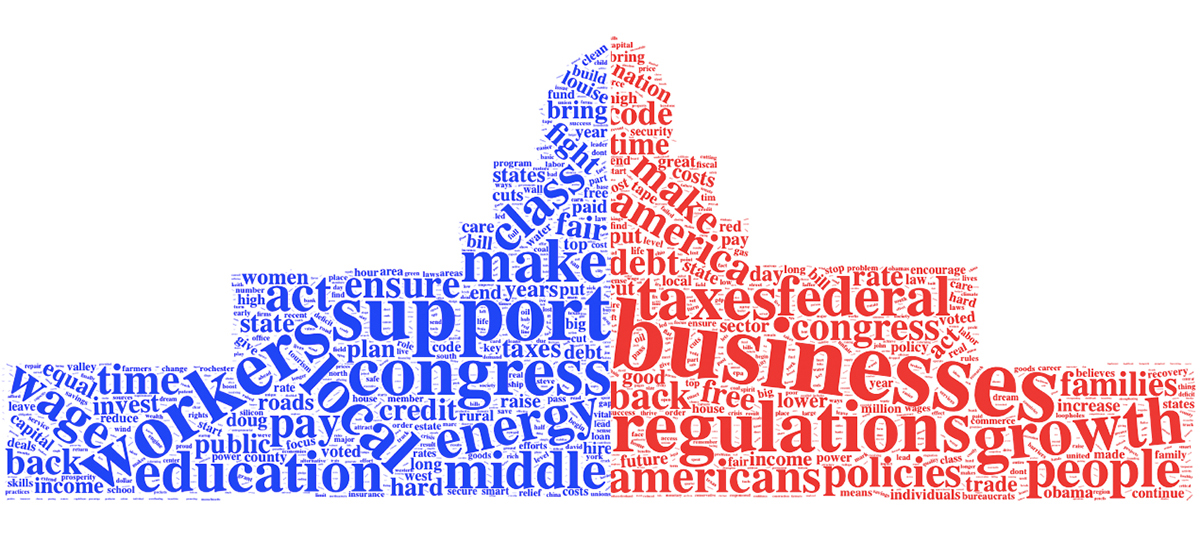Examining the role of gerrymandering in campaign discourse

There is a plethora of political science research examining how partisan gerrymandering impacts everything from voter turnout to candidate selection.
But until recently, little research has examined the relationship between gerrymandering — the manipulation of boundaries of an electoral constituency to favor a political party in elections — and the tenor of political discourse.
In other words, does gerrymandering lead to more politically extreme campaign rhetoric?
St. Olaf College Associate Professor of Political Science Chris Chapp and three students spent several months this summer evaluating exactly that. Using a machine learning algorithm to measure rhetoric extremity on U.S. House candidates’ campaign websites, they scored more than 32,000 unique issue-positions (the positions that candidates state they have on issues of interest to voters) from 2008 to 2016.
What they found perhaps isn’t surprising: Districts gerrymandered to create a partisan skew can lead to more extreme rhetoric.
“Based on our initial findings, there is reason to believe that the type of redistricting process used to draw Congressional boundaries makes a difference when examining the polarization of campaign rhetoric,” says Caroline Pippert ’19, one of the students who worked on the project. “The fact that the redistricting process matters means that efforts to try to change the way our congressional maps are drawn are worth pursuing.”
The team will present their research at the Minnesota Political Science Association Conference in November.
This project is part of the college’s Collaborative Undergraduate Research and Inquiry (CURI) program, which provides opportunities for St. Olaf students from all academic disciplines to gain an in-depth understanding of a particular subject by working closely with a St. Olaf faculty member in a research framework. The research also received funding from the Institute for Freedom & Community, which works to promote free inquiry and meaningful debate of important political and social issues.
Chapp, who teaches courses on research methodology and American political behavior, has long been interested in political communication and campaign rhetoric. To support his research on these issues, he has worked with St. Olaf students to compile an extensive database of issue pages (the pages outlining a candidate’s position on various issues) from the websites of every U.S. House of Representatives candidate in election years from 2008-2016. It’s thought to be the largest archive of American Congressional campaign rhetoric in the world, and has already been used to support published research by St. Olaf students.
Last year, Chapp and researchers Tyler Benning ’17, Aidan Zielske ’18, and Professor of Political Science Dan Hofrenning had an essay titled “Experienced Legislator or Career Politician? Outsider Rhetoric in the 2016 Election” published in a book titled Conventional Wisdom, Parties, and Broken Barriers in the 2016 Election.
The gerrymandering project built on Chapp’s earlier work. The CURI team of Pippert, Mykhe Nguyen ’19, and Addison Tryon ’19, used a supervised machine learning procedure based on a randomly drawn training set from websites of U.S. House incumbents from 2008 to 2016 to generate an extremity score for each candidate. The extremity score was based on key differentiating words that indicate the level of partisan rhetoric (see image below).

They point to three main takeaways from their findings:
- In districts where partisan lean is not reflective of the state as a whole, they observed more extreme rhetoric.
- In Republican redistricted states they observed more conservative rhetoric from Democratic candidates, indicating that Democrats are more responsive to partisan lean.
- Overall, they observed nuanced results that indicate redistricting practices are relevant when examining partisan campaign rhetoric.
“I hope that our findings can help the community understand better the division in our politics and the reality of how they function,” says Tryon, a political science and American studies major. “None of our results are conclusive or point to a causal relationship — but the study of gerrymandering can help draw attention to it as a way of fostering more conversation about politics, which is necessary for our democratic society.”
Chapp says for him, the most rewarding part of this project is seeing students dig into the data and produce nuanced analysis that can help inform lawmakers and voters alike.
“Information is important, and having an informed citizenry is essential to healthy democratic governance,” he says. “What we’re doing in the Political Science Department at St. Olaf informs this conversation because students are not just passive recipients of information — the work they’re doing is generating new information and knowledge.”

Nguyen, a political science and mathematics major with a statistics concentration, says the project was a great example of how data can illustrate and inform concerns with a practice like gerrymandering.
“I am passionate about politics and the distribution of power, and I am fond of working with data,” she says. “I see a combination of my interest and skills in Professor Chapp’s project.”
Both Nguyen and Pippert noted that poring over thousands of campaign websites this summer also gave them an appreciation for the wide variety of candidates who run for Congress — and their approach to the issues that matter most to voters.
“I learned more about American electoral politics than I could have ever imagined,” Nguyen says.